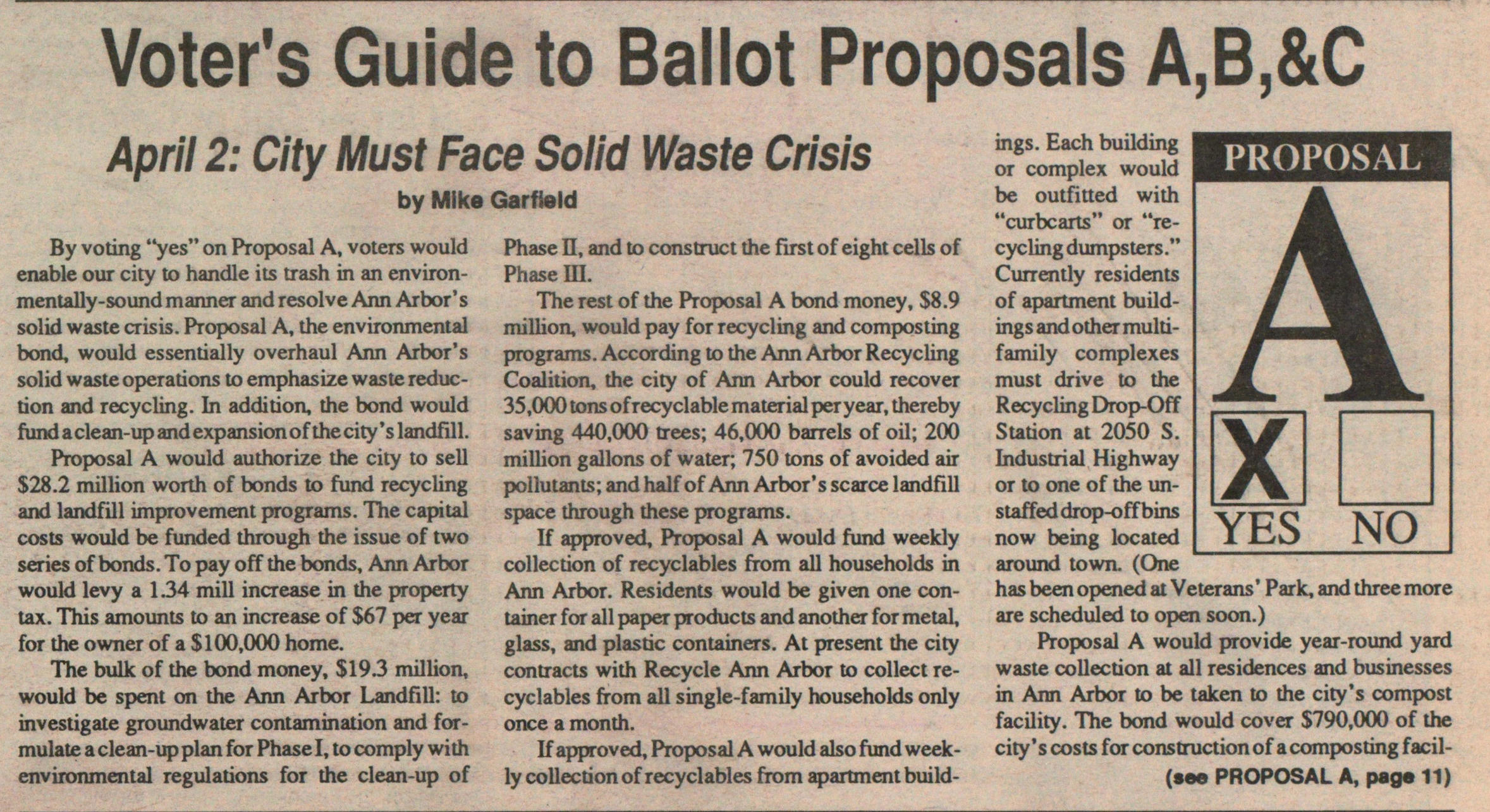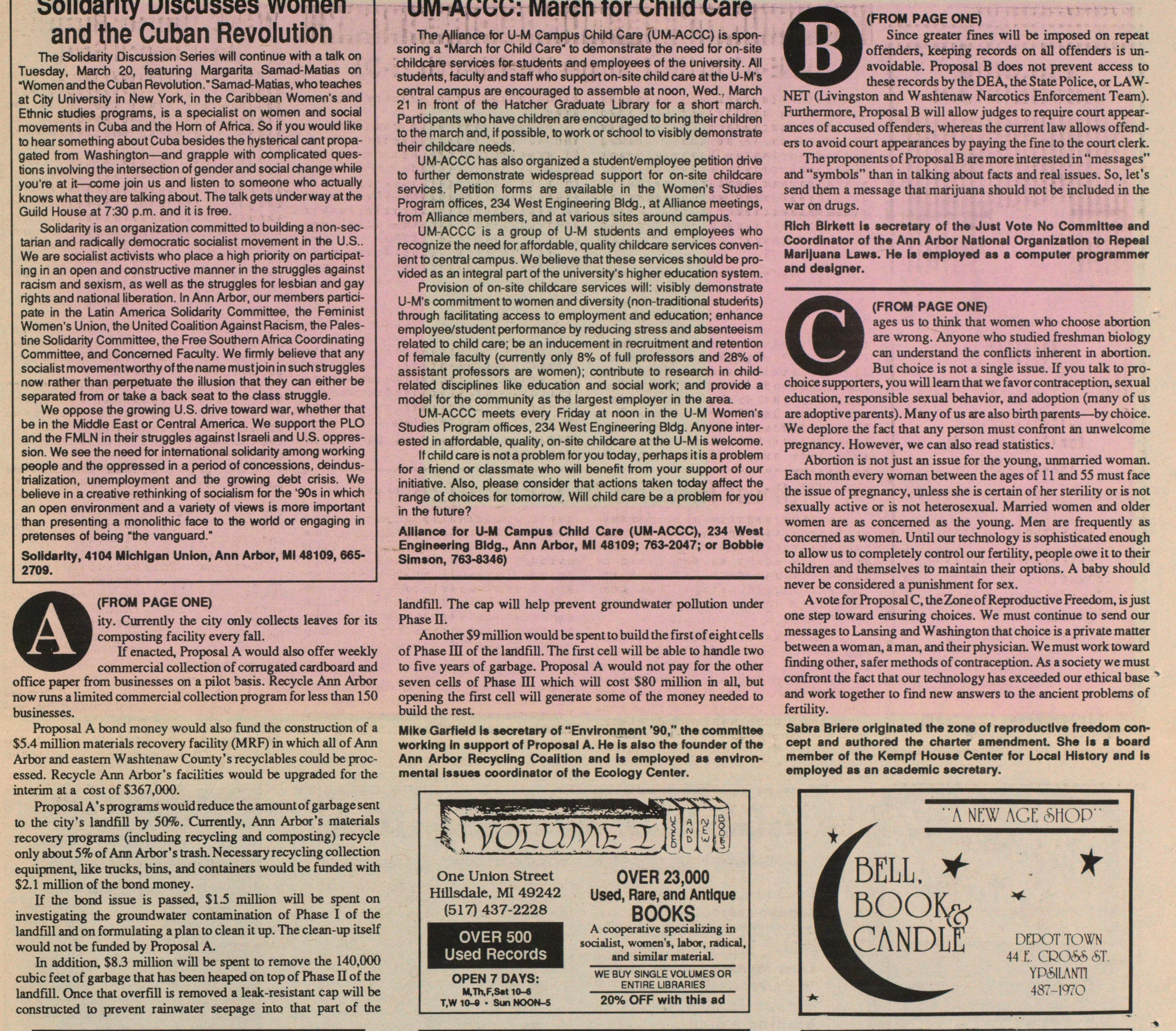Voter's Guide To Ballot Proposals A,B,&C


By voting "yes" on Proposal A, voters would enable our city to handle its trash in an environmentally-sound manner and resolve Ann Arbor's solid waste crisis. Proposal A, the environmental bond, would essentially overhaul Ann Arbor's solid waste opera dons to emphasize waste reduction and recycling. In addition, the bond would fund a clean-up and expansion of the city's landfill.
Proposal A would authorize the city to sell $28.2 million worth of bonds to fund recycling and landfill improvement programs. The capital costs would be funded through the issue of two series of bonds. To pay off the bonds, Ann Arbor would levy a 1.34 mill increase in the property tax. This amounts to an increase of $67 per year for the owner of a $100,000 home.
The bulk of the bond money, $193 million, would be spent on the Ann Arbor Landfill: to investigate groundwater contamination and formulate a clean-up plan for Phase I, to comply with environmental regulations for the clean-up of Phase II, and to construct the first of eight cells of Phase III.
The rest of the Proposal A bond money, S8.9 million, would pay for recycling and composting programs. According to the Ann Arbor Recycling Coalition, the city of Ann Arbor could recover 35,000 tons of recyclable material per year, thereby saving 440,000 trees; 46,000 barrels of oil; 200 million gallons of water; 750 tons of avoided air pollutants; and half of Ann Arbor's scarce landfill space through these programs.
If approved, Proposal A would fund weekly collection of recyclables from all households in Ann Arbor. Residents would be given one container for all paper products and another for metal, glass, and plastic containers. At present the city contracts with Recycle Ann Arbor to collect recyclables from all single-family households only once a month.
If approved, Proposal A would also fund weekly collection of recyclables from apartment buildings. Each building or complex would be outfitted with "curbcarts" or "recycling dumpsters." Currently residents of apartment buildings and other multi-family complexes must drive to the Recycling Drop-Off Station at 2050 S. Industrial Highway or to one of the unstaffed drop-off bins now being located around town. (One has been opened at Veterans ' Park, and three more are scheduled to open soon.)
Proposal A would provide year-round yard waste collection at all residences and businesses in Ann Arbor to be taken to the city's compost facility. The bond would cover $790,000 of the city's costs for construction of a composting facility. Currently the city only collects leaves for its composting facility every fall.
If enacted, Proposal A would also offer weekly commercial collection of corrugated cardboard and office paper from businesses on a pilot basis. Recycle Ann Arbor now runs a limited commercial collection program for less than 150 businesses.
Proposal A bond money would also fund the construction of a $5.4 million materials recovery facility (MRF) in which all of Ann Arbor and eastern Washtenaw County's recyclables could be processed. Recycle Ann Arbor 's facilities would be upgraded for the interim at a cost of $367,000. Proposal A's programs would reduce the amount of garbage sent to the city's landfill by 50%. Currently, Ann Arbor's materials recovery programs (including recycling and composting) recycle only about 5% of Ann Arbor's trash. Necessary recycling collection equipment, like trucks, bins, and containers would be funded with $2.1 million of the bond money.
If the bond issue is passed, $1.5 million will be spent on investigating the groundwater contamination of Phase I of the landfill and on formulating a plan to clean it up. The clean-up itself would not be funded by Proposal A.
In addition, $8.3 million will be spent to remove the 140,000 cubic feet of garbage that has been heaped on top of Phase II of the landfill. Once that overfill is removed a leak-resistant cap will be constructed to prevent rainwater seepage into that part of the landfill. The cap will help prevent groundwater pollution under Phase II.
Another $9 million would be spent to build the first of eight cells of Phase ID of the landfill. The first cell will be able to handle two to five years of garbage. Proposal A would not pay for the other seven cells of Phase III which will cost $80 million in all, but opening the first cell will generate some of the money needed to build the rest.
Mike Garfield Is secretary of "Environment '90," the committee working in support of Proposal A. He is also the founder of the Ann Arbor Recycling Coalition and is employed as environmental issues coordinator of the Ecology Center.
(FROM PAGE ONE) B Since greater fines will be imposed on repeat offenders, keeping records on all offenders is unavoidable. Proposal B does not prevent access to these records by the DEA, the State Police, or LAWNET (Livingston and Washtenaw Narcotics Enforcement Team). Furthermore, Proposal B will allow judges to require court appearances of accused offenders, whereas the current law allows offenders to avoid court appearances by paying the fine to the court clerk.
The proponents of Proposal B are more interested in "messages" and "symbols" than in talking about facts and real issues. So, let's send them a message that marijuana should not be included in the war on drugs.
Rich Birkett is secretary of the Just Vote No Committee and Coordinator of the Ann Arbor National Organization to Repeal Marijuana Law. He is employed as a computer programmer and designer.
(FROM PAGE ONE) C ages us to think that women who choose abortion are wrong. Anyone who studied freshman biology can understand the conflicts inherent in abortion. But choice is not a single issue. If you talk to pro-choice supporters, you will learn that we favor contraception, sexual education, responsible sexual behavior, and adoption (many of us are adoptive parents). Many of us are also birth parents - by choice. We deplore the fact that any person must confront an unwelcome pregnancy. However, we can also read statistics.
Abortion is not just an issue for the young, unmarried woman. Each month every woman between the ages of 11 and 55 must face the issue of pregnancy, unless she is certain of her sterility or is not sexually active or is not heterosexual. Married women and older women are as concerned as the young. Men are frequently as concerned as women. Until our technology is sophisticated enough to allow us to completely control our fertility, people owe it to their children and themselves to maintain their options. A baby should never be considered a punishment for sex.
A vote for Proposal C, the Zone of Reproductive Freedom, is just one step toward ensuring choices. We must continue to send our messages to Lansing and Washington that choice is a private matter between a woman, a man, and their physician. We must work toward finding other, safer methods of contraception. As a society we must confront the fact that our technology has exceeded our ethical base and work together to find new answers to the ancient problems of fertility.
Sabra Briere originated the zone of reproductive freedom concept and authored the charter amendment She is a board member of the Kempf House Center for Local History and is employed as an academic secretary.